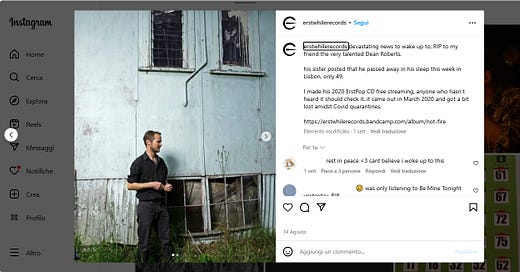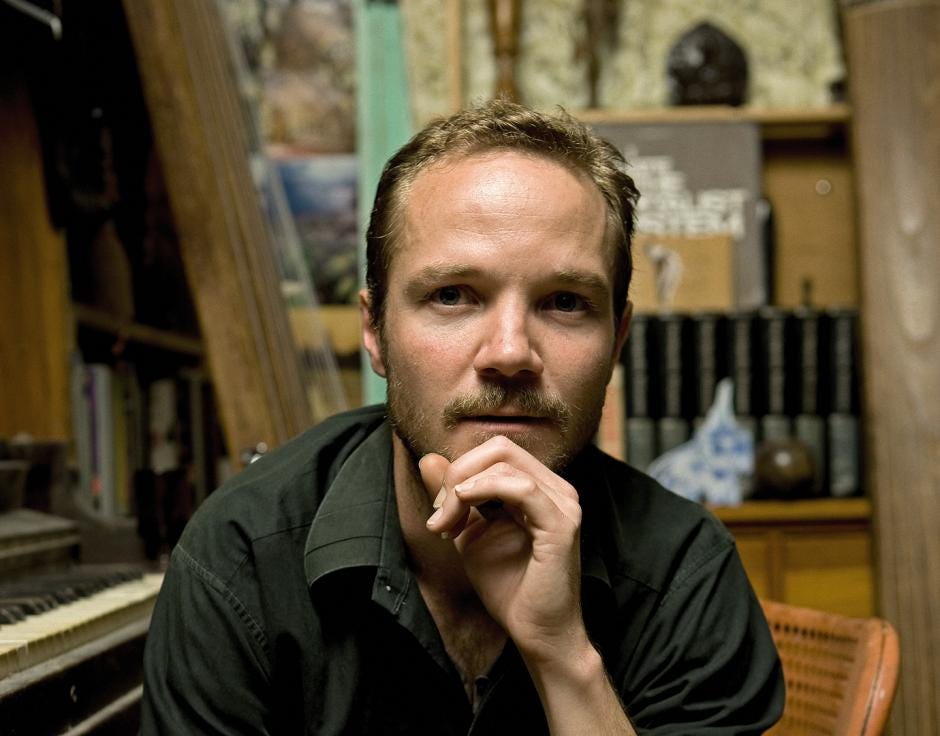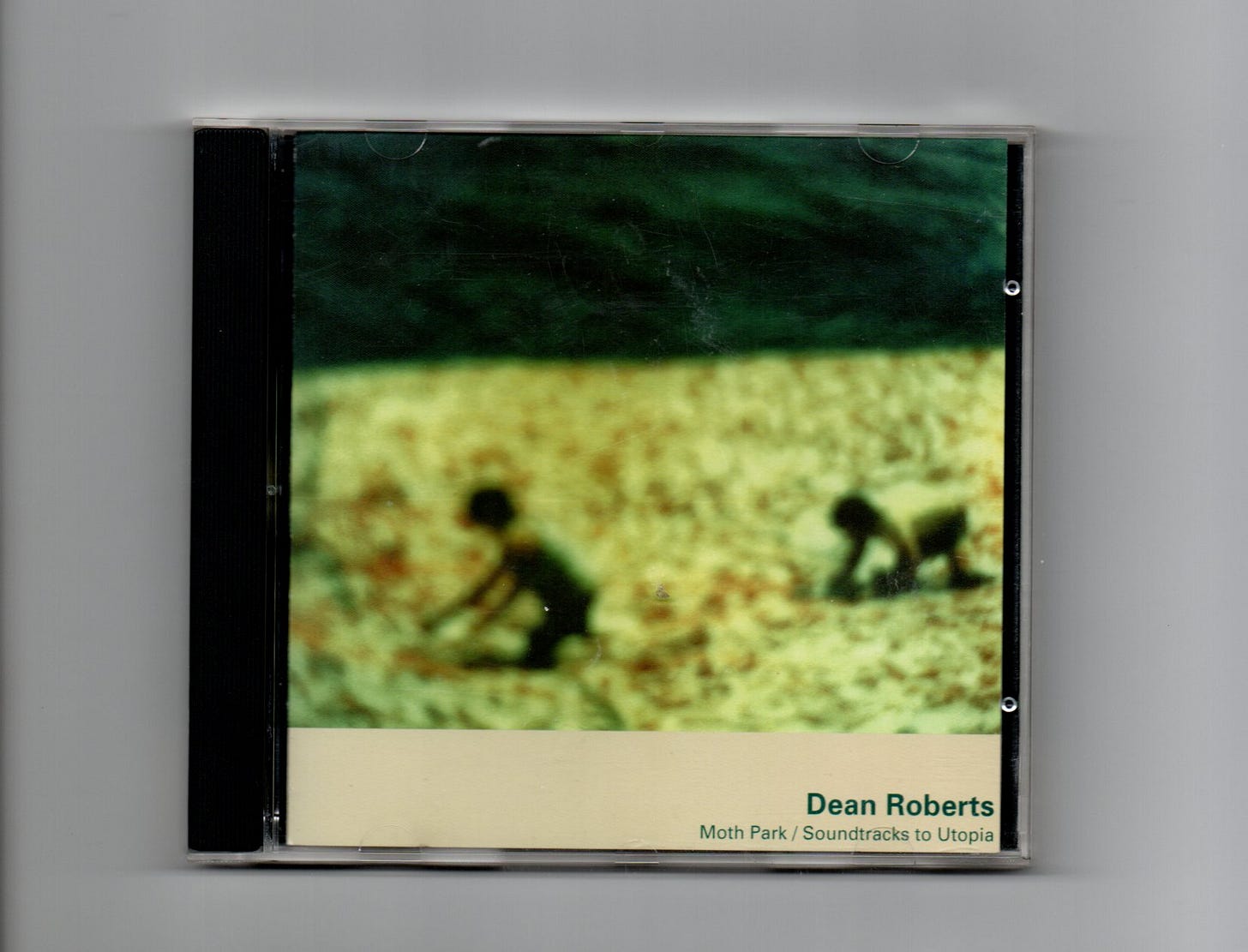The news is one of those that leaves you breathless. On August 10, 2024, the guitarist / experimenter / composer from New Zealand Dean Roberts passed away suddenly in his sleep. He was 49 years old. The news was given by Jon Abbey of Erstwhile Records, citing the musician's sister.
What a fate, to die like this, when he still had so much to say and to make us listen to. I have no further information and, perhaps, it is right that way. Roberts has never been one who loved the limelight, like many other musicians involved in experimental music; he probably would have appreciated the affectionate declarations of esteem that are bouncing around the net from enthusiasts and colleagues, but he would not have given too much information. I don't know, I never had the pleasure of knowing him, mine is a feeling that comes from listening to his music, with which I am still trying to come to terms.
Just recently I had purchased, at a very cheap price, his first solo work "Moth Park / Soundracks to Utopia" published by Formacentric Disk, his personal label, created in 1995, to promote his music.
An album that confirmed my personal doubts about his music: ambient? Sound Art? Slow fi? Warm isolationism? Deconstructed architecture? I have never been able to give myself precise answers.
But who was Dean Roberts? Dean Roberts was a guitarist, experimental composer and multi-instrumentalist who began his career in the New Zealand noise trio Thela, before embarking on a series of solo projects and albums with Autistic Daughters.
His first solo album, Moth Park (Formacentric, 1998), presented a very particular music, a balanced mix between spirituality and ambient, psychedelia and ethnic (thinking of “My life in a Bush of Ghost” by Eno/Byrne). But his masterpiece, I think, was that “All Cracked Medias” (Mille Plateaux, 1999), which left me decidedly disconcerted.
A student of Scratch Orchestra member Philip Dadson, Roberts approached composed sound sculpture through the meta-musical relationship of the exploratory improvisational orchestra. Roberts took a performance-based approach to the presentation of sound, relying on unconventional “prepared” and “tabletop” guitar treatments and a fluid phraseology of texture and timbre. The three lengthy pieces that comprise “All Cracked Medias,” employed guitars, piano, and various percussive devices, citing examples from the British improvisational ensemble AMM.
It blew me away. At the time I was still trying to understand Brian Eno's ambient and Tortoise's post-rock. I didn't understand anything about this album, I decided, wisely, to file it away and grow. I had decided to try again with "Moth Park/Soundracks to Utopia", to then climb his discography.
"Moth Park/Soundracks to Utopia" was made in 1997 in Auckland, New Zealand, with Dean Roberts playing lead electric guitar live into a two-track recorder; the four long compositions on the record consist of melancholic, subdued soundscapes that carefully avoid organized tones or even any kind of ambient wash. You can hear the quotes and references from Fred Frith's guitar solos, Keith Rowe's prepared guitar experiments and the work of Remko Scha, Allan Bryant, Glen Branca... and other pleasant obsessions.
Incorporating drone, sound sculpture, the work of AMM, and developing a body of work primarily focused on the electric guitar, employed with extensive preparations and techniques, “Moth Park/Soundracks to Utopia” defines both a concise and definitive exploration of the style of a certain type of harmonically fluorescent prepared electric guitar, and a form of 4 soundtrack tracks, in a dense and colorful work that speaks of complexity, control and shows a unique modernist approach to an instrument killed and brought back to life outside of popular music. This album shares an ethic and an alignment with the developmental work of instrument deconstructivists such as Frith/Reichel/Remko Scha, although this rigorous approach is balanced by an underlying narrative thread.
These are the few words that tell us how Dean Roberts was one of the most anomalous and particular guitarists in the research area, while not disdaining less experimental and more intelligible incursions, has suddenly passed away leaving a void that is difficult to fill. His music has touched folk, ambient, drone music, neo-minimalism and much more creating a personal and recognizable blend, as well as for the humanity and availability of his person, which many are recognizing on social media since the news spread. Farewell, Dean Roberts.






